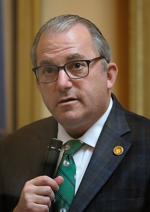Virginia’s General Assembly is going to feel a lot different this year — look for lots of fiery speeches but perhaps not all that much action.
With Democrats gaining the House majority while retaining control of the Senate, plenty of newcomers — some of whom got to the legislature by complaining that the old hands they defeated weren’t vocal enough on key partisan issues — and a Republican governor, Glenn Youngkin, eager to say he has made Virginia a model for the nation, the tone around Capitol Square is going to feel even more like Capitol Hill, political scientists say.
“I think the session will be about signaling for upcoming elections,” said Stephen Farnsworth, a political scientist at the University of Mary Washington.
People are also reading…
“Democrats and Republicans will want to talk about what they stand for ... that speechifying will likely lead to a lot of gridlock.”

More than one-third of the 140 legislators who will convene at the state Capitol next week will be new to their seats.
As the 31 new members of the House of Delegates and the 17 new senators take their seats at their respective chambers for the 60-day session that begins Jan. 10, floor sessions could get a lot showier, said Mark Rozell, dean of the Schar School of Policy and Government at George Mason University.
“Many of the workhorses are gone; let’s see if the show horses take over,” Rozell said.
“There is a likelihood that newcomers, who tend to be more ideologically driven and less experienced or situationally aware, may be compelled to unload frequently, with less restraint or adherence to established decorum,” he said.
“None of that bodes well for actually getting the job of legislating done.”
How much gets done depends on two big questions.
The first: Which of the two signals Youngkin has been making will show what his attitude toward the new Democratic majority will be?
The governor touts both the bipartisan support for the final, delayed budget deal in the 2023 session — but carefully notes that the state constitution gives him a veto pen.
The second question: Which signals from the Democrats will set the tone?
The Senate Democratic caucus — which will hold a 21-19 edge in the chamber — called the centerpiece of Youngkin’s goals for the General Assembly, his budget proposal for fiscal years 2025 and 2026, “absolutely disgraceful” and “a slap in the face of our most vulnerable individuals who call our Commonwealth home.”
Yet among the first, low-numbered bills they have introduced — traditionally a signal of a majority’s priorities — is a longstanding one: an increase in the minimum wage.
It’s a funny signal, though. Instead of pushing for an immediate rise to $15 an hour, or an increase beyond that or minimums indexed to inflation, the bill simply proposes to step up the pace of the phased-in increases approved in 2020.
It looks more like a signal to Virginia’s businesses — especially the small businesses in some of the less prosperous corners of the state — that an even more progressive Democratic majority than the one that passed the minimum wage legislation is sensitive to business concerns.

McGlennon
“For the Democrats, pushing the minimum wage higher faster probably carries minimal benefits, as wages where jobs are plentiful and workers are in demand are already passing the minimum,” said John McGlennon, a political scientist at the College of William & Mary.
“And in places where jobs are not as readily available, the tenuous economic circumstances of companies may make the increased minimum a bridge too far.”
“Both the governor and the Democratic legislative leaders will want to show some accomplishment. Addressing mental health has broad support,” McGlennon said.
“Child care will likewise find support on both sides of the aisle. ... Virginia is looking to cushion the loss of federal aid ...
“But there are going to be so many new members that even in this long session it will be hard to accomplish much,” he added. (The long session, of 60 days, comes in even-numbered years, in which Virginia lawmakers debate and approve the state’s two-year budget. In odd-numbered years, Virginia lawmakers meet in “short” sessions that usually last 45 days.)
Across the aisle — or maybe not
Concern over hard-pressed small business, meanwhile, is generating an unusual bipartisan coalition, with some of the General Assembly’s most conservative and most liberal members saying they want to work on a plan to regulate and tax skill games, the slot-machine-like devices the legislature tried to ban in 2020.
What to do about skill games, like what Virginia will do about marijuana, now that possession of small amounts and growing it for recreational use is legal for adults, will likely be a major focus of attention — and quiet negotiation, political operatives say.
Democrats will want to signal to at least some Republicans that there’s a reasonable way to tax and regulate sales — it is not that dim a hope since in 2021, two GOP state senators who will not be in the 2024 session voted with all the Democrats to legalize possession.
As a bill works its way through the General Assembly, with or without GOP support, legislators will want to signal to a governor who does not like the idea of recreational marijuana use that it’s better to have a hand in shaping regulation — as Youngkin did this year with the regulatory reform for electric utilities — than to watch a wide-open uncontrolled market emerge.
Democrats, meanwhile, will have to walk a careful line over the equity issue — the idea that a regulated marijuana market should ensure that minority businesses and communities have a place, a priority for progressives, who note that marijuana enforcement has disproportionately affected people of color.

Akomolafe
“My take on the marijuana issue is that it may actually be one of those areas where Governor Youngkin might cut the Democrats some slack by giving up some ground,” said Olusoji Akomolafe, chair of the political science department at Norfolk State University.
If, as Akomolafe expects, Youngkin still has national political aspirations, “he would need bipartisan credentials to convince the national audience that he is capable of governing in a state where Democrats dominated both houses.”
“In that case, it would serve him better to play Governor Bipartisanship rather than Governor No-to-Everything,” he said.
Youngkin has not been reluctant to veto or amend bills.
“Remember in his first session in 2022, Youngkin used the veto power seemingly to enact vendettas against Adam Ebbin and Northern Virginia localities,” said Rich Meagher, chair of the political science department at Randolph-Macon College.

Ebbin
(In the 2022 session, which featured partisan fights over personnel appointments, 10 bills filed by Sen. Adam Ebbin, D-Alexandria, reached the governor’s desk. Youngkin amended one and vetoed the other nine.)
“Although he played nicer last year, he still issued a bunch of amendments,” Meagher said. “And Youngkin is likely to get a lot more bills that he won’t like this year. Youngkin’s political future hangs over everything he does.”
Consensus and discord
Bipartisan support on enhancing behavioral health services and economic development programs should mean bills will reach the desk of a governor willing to sign them into law, political scientists say. Budget measures on these will also likely get broad support.
“Legislation on emotionally charged social issues such as abortion, guns, restoration of rights, LGBTQ rights is essentially dead on arrival. Those bills, however, are red meat for base voters, so we will see them regardless of whether they’re likely to become law,” said George Mason’s Rozell.

Rozell
“Should the Democrats manage to hold their one-seat majorities together on such votes, Youngkin would veto them and there’s no chance of a two-thirds vote to override,” he said.
(Democrats could make progress on a proposed constitutional amendment on automatic restoration of voter rights. While amending the constitution is a multiyear process, a governor does not get to sign or veto a proposed amendment.)
The budget is different.
“You can always work out something, you may give up something here, gain something there; nobody is ever completely happy, but everyone gets something,” said Farnsworth, at the University of Mary Washington.
Still, the standoff that sparked the six-month delay in revisions to the existing budget that ends June 30, 2024 — Youngkin’s push for tax cuts, Democrats’ call for increased spending on schools — could still be an issue.
In his proposed two-year budget for July 1, 2024, through June 30, 2026, Youngkin is again seeking income tax rate cuts in what he calls his “unleashing opportunity budget,” but he is also proposing an increase in the sales tax rate, and talking about levying it on a wide range of digital sales, including streaming services and digital downloads.
That combination of the proposed increase and the wider application would translate to a $723.5 million increase in what shoppers pay over the 12 months beginning July 1 and $1.8 billion the following year — a total more than offset by the $1.1 billion they save from income tax rate cuts next year and $2.3 billion the year after that.
“I don’t like it,” said state Sen. Mamie Locke, D-Hampton, a senior member of the Senate Finance Committee. “Sales taxes are regressive; they hit poor people harder.”

Sen. Mamie Locke, D-Hampton, leads the Senate Democratic Caucus.
“The budget is the major policy decision ... and the gulf between the parties is likely to be wide,” said William & Mary’s McGlennon.
Youngkin “has taken a kind of scattershot approach, calling for reduction in income tax rates and shifting costs to the sales tax” and talking about eliminating the car tax, McGlennon said.
“Most of these would shift taxes toward low/moderate income taxpayers ... or reduce local government revenues or require increased property taxes,” said McGlennon, who has served on the James City County Board of Supervisors since 1997 and recently won reelection. Making up for the loss of car tax collections to local governments could cost as much as $3 billion a year, he added.
“With the JLARC study noting state underfunding of education by at least $1 billion, pressure for more transportation dollars” for the Washington Metropolitan Area Transit Authority in Northern Virginia “and other efforts, we may well go into overtime once again over Youngkin’s one budget that will entirely fall within his tenure,” McGlennon said.
Maybe yes, maybe no?
Also among Democratic caucuses’ early bills — the ones that signal priorities — are measures to bypass the governor directly, starting with the multiyear effort to amend the constitution to assure a right to abortion and the restoration of rights to Virginians after they have completed serving sentences for felonies.
Amending the constitution, ultimately up to voters, starts with a joint resolution, and resolutions of the General Assembly are not subject to veto.
But because an amendment is about a right, Republicans are already arguing that it would expand current access to abortion beyond the second trimester detailed in current Virginia law, which they say shows Democrats are extremists on the issue.
On the other hand, “I’m not sure that the Republicans want to keep that issue in front of the electorate,” McGlennon said. In order to win approval, a constitutional amendment resolution has to win General Assembly approval in two different sessions with an election for the House in between, then win voters’ approval in a statewide referendum.
“It would seem as though they would prefer to get through the 2025 election before having to worry about the final vote to put the amendment on the ballot,” McGlennon said. “If it does make it there, the fight can be joined in the general election on the basis that the amendment goes too far.”
Youngkin, meanwhile, wants to ban the social media app TikTok for anyone under the age of 18 as part of a package of measures including bans on targeting ads at children, selling children’s data and creating marketing profiles of minor individuals.
He also wants to push again for allowing murder charges for dealers when their drugs cause fatal overdoses. Democrats defeated this proposal last year, outraging the governor. The issue, however, did not appear on many GOP election fliers to back charges that Democrats were soft on crime.
Democrats are also likely to try to do away with at least some of Virginia’s mandatory minimum prison sentences. Their argument is that these laws take away judges’ power to set appropriate punishments.
Democrats have their own tax reform proposal, aimed at stepping up the pace of replacement or renovation of the state’s aging public school buildings.

Sens. Jeremy McPike, D-Prince William, left, and Scott Surovell, D-Fairfax, confer last January during the General Assembly session. Surovell will be the new Senate majority leader, succeeding Sen. Dick Saslaw, D-Fairfax, who is retiring.
State Sen. Jeremy McPike, D-Prince William, has filed a bill that would let every county and city hold a referendum to let voters decide if they want a 1 percentage point surcharge on sales taxes to finance local school construction and renovations.
Del. Marcus Simon, D-Fairfax, proposed a campaign finance reform measure that would bar candidates from using campaign funds for personal use.
Dealing with gun violence is another Democratic priority. Among their first bills is one that would make buying, selling or transferring an assault firearm a Class 1 misdemeanor, subject to up to 12 months in jail. The Democratic majority in the Senate passed a similar bill in 2023, but it died in what was then a Republican-led House.
Gun liability bills introduced by Del. Rodney Willett, D-Henrico, and state Sen.-elect Schuyler VanValkenburg, D-Henrico, would make it a misdemeanor, punishable by up to a year in jail, if a minor uses a firearm owner’s weapon to commit a crime, or if the minor brings a firearm on school premises, or causes bodily injury and harm to themselves or another person.
The idea is a response to the fatal shooting of 13-year-old Lucia Bremer by a fellow Quioccasin Middle School student.
“Lucia is dead, in part, because a gun owner chose to leave his semi-automatic handgun easily accessible to his troubled teenager, who he knew to be a danger to others,” said Lucia’s parents, Jonathan and Meredith Bremer, in a joint statement asking the General Assembly to enact the bills.
Last January, a 6-year-old boy, holding his mother’s gun, shot a teacher in a Newport News classroom.
“We have come to learn that minors in Virginia — and around our country, for that matter — are gaining access to firearms belonging to their parents and guardians with alarming frequency,” the couple added.
PHOTOS: General Assembly Building construction

Construction on the new General Assembly Building on Capitol Square at North Ninth and East Broad streets in Richmond is scheduled to be completed next year.

The General Assembly Building under construction is see from the VCU Children's Hospital of Richmond building that is also under construction Tuesday, May 18, 2021.

The state has projects underway: Old City Hall (left), the new Virginia General Assembly Building (center) and a parking deck (right). The state Capitol is seen behind Old City Hall.

Old City Hall, left, the new Virginia General Assembly Building, center and the new legislative parking deck, right, are seen in this panoramic photo of East Broad Street in Richmond, on Sept. 17. The Virginia state Capitol is seen behind Old City Hall.

Artist rendering of the parking deck at southwest corner of Ninth and Broad streets (right side), across Ninth Street from the planned General Assembly Building.

Rendering of the planned General Assembly Building from the view of 10th Street.

A rendering of a committee room inside the planned General Assembly Building.

Rendering of the cafe area of the planned General Assembly Building.

A rendering shows the entrance lobby of the planned General Assembly Building, which is expected to be completed by fall 2022.

Rendering of the first floor commons area in the General Assembly Building.

Workmen continue constrution of the new General Assembly Building at Capitol Square in Richmond, VA Wednesday, June 2, 2021. The traffic light and sign are at the nearby intersection of 9th and Grace Streets.

The General Assembly Building under construction is seen from the VCU Children's Hospital of Richmond building that is also under construction Tuesday, May 18, 2021.

The General Assembly Building under construction is see from the VCU Children's Hospital of Richmond building that is also under construction Tuesday, May 18, 2021.

Old City Hall is under construction Monday, May 17, 2021. The new General Assembly building being constructed rises behind it.

The ground is being excavated on Wednesday, April 7, 2021 to make way for the new General Assembly Building parking deck.

The ground is being excavated on Wednesday, April 7, 2021, to make way for the new General Assembly Building parking deck. The new GA Building rises behind it on left.

The ground is being excavated on Friday, April 9, 2021 to make way for the new General Assembly Building parking deck. The new GA Building rises behind it on left.

The new General Assembly Building under construction at 9th and Broad Streets in Richmond, Va Friday,, March 5, 2021.

The new General Assembly Building under construction at 9th and Broad Streets in Richmond, Va Friday,, March 5, 2021.

The new General Assembly Building under construction at 9th and Broad Streets in Richmond, Va Friday,, March 5, 2021.

Workmem on scaffolding at the new General Assembly Building under construction at 9th and Broad Streets in Richmond, Va Friday,, March 5, 2021.

Workmem outside the new General Assembly Building under construction at 9th and Broad Streets in Richmond, Va Friday,, March 5, 2021.

The elevator shaft of the General Assembly Building rises above the Capitol Wed., Jan. 6, 2021.

The General Assembly building is under construction Saturday, June 6, 2020.

The statue of Suffragist Adele Clark at the Virginia Women's Memorial inside Capitol Square in Richmond, VA appears to be glancing at the new General Assembly Building , right, under construction Tuesday, Nov. 17, 2020.

In August, scaffolding surrounded Old City Hall during renovation work as construction was underway on the new General Assembly Building (center left) downtown.

A worker on the General Assembly Building stops to watch the protest against Northam's new COVID restrictions. The protesters rallied on the corner of East Grace and North Ninth Streets across from Capitol Square Thursday, November 19, 2020.

Construction work continues at the General Assembly Building Wednesday, November 18, 2020.

Construction work continues at the General Assembly Building. Union officials have claimed that some of the project’s workers are being classified as independent contractors, which can affect taxes and overtime pay.

The General Assembly Building in downtown Richmond will be 14 stories.

A council of carpenters claims that about 60 workers on the General Assembly Building have been misclassified.

The 307-foot-tall crane that will be used to help construct the new Virginia General Assembly Building at Capitol Square in Richmond, VA Monday, June 24, 2019. Photographed from the City Hall observation deck.

The 307-foot-tall crane that will be used to help construct the new Virginia General Assembly Building at Capitol Square in Richmond, VA Monday, June 24, 2019. Photographed from the City Hall observation deck.

A person looking out a window of the City Hall ovservation deck comes face-to-face with the 307-foot-tall crane that will be used to help construct the new Virginia General Assembly Building at Capitol Square in Richmond, VA Monday, June 24, 2019.

The 307-foot-tall crane that will be used to help construct the new Virginia General Assembly Building at Capitol Square in Richmond, VA Monday, June 24, 2019.

The 307-foot-tall crane that will be used to help construct the new Virginia General Assembly Building at Capitol Square in Richmond, VA Monday, June 24, 2019. Photographed from the Barbara Johns Building rooftop.

Contractors began working last week to raise a 307-foot-tall tower crane to assist with construction of the General Assembly Building. In mid-2020, the crane will be extended an added 30 feet. The building is set to be completed in 2021 and will keep its original façade from 1912.

The 105-year-old facade is all that remains of the former General Assembly Building at Ninth and East Broad streets. The historic wall, a design influenced by the 16th-century Venetian architect Andrea Palladio, spans six floors and has served as the inspiration for the replacement General Assembly Building. The new building will be 15 stories with a modern classical design.

A workman on a ladder attaches a cable to a beam of the old General Assembly Building, which is being torn down beside Capitol Square in Richmond, VA Friday, May 22, 2018. The building in the background is Richmond City Hall.

Work continues on the destruction of the former General Assembly building on Tuesday, May 8, 2018.

Workers are demolishing the General Assembly building piece by piece. This week, all that's left of the western portion of the building is the glass fascade facing Broad Street.

Demolition continues on the General Assembly Building beside the Virginia State Capitol, right, in Richmond, VA Thursday, April 26, 2018. The work of taking down and removing the building will continue into the summer and a replacement will be ready in 3-4 years.

Demolition continues on the General Assembly Building across from Richmond City Hall, left, in Richmond, VA Thursday, April 26, 2018. The work of taking down and removing the building will continue into the summer and a replacement will be ready in 3-4 years.

The shell of the General Assembly Building now undergoing demolition just outside Capitol Square in Ricmond, VA Friday, March 30, 2018. The building will be replaced with a new structure to house General Assembly members, staff and committees.

The decision to preserve the 1912 facade of the old General Assembly Building facing the Capitol added time and cost to the project. The scope of the project has been reduced to save money.

A photo (bottom part of frame) of part of the original General Assembly Building now undergoing demolition hangs on the construction fence just outside Capitol Square in Ricmond, VA Friday, March 30, 2018. The building will be replaced with a new structure to house General Assembly members, staff and committees.

A workman showers sparks as he cuts a steel beam inside the shell of the General Assembly Building now undergoing demolition just outside Capitol Square in Ricmond, VA Friday, March 30, 2018. The building will be replaced with a new structure to house General Assembly members, staff and committees.
Dave Ress (804) 649-6948
"general" - Google News
January 02, 2024 at 05:00PM
https://ift.tt/Ca0kR9u
Lots of talk, perhaps not much action in 2024 General Assembly - Richmond Times-Dispatch
"general" - Google News
https://ift.tt/9iGHzKb
https://ift.tt/8NfXAVr
Bagikan Berita Ini














0 Response to "Lots of talk, perhaps not much action in 2024 General Assembly - Richmond Times-Dispatch"
Post a Comment